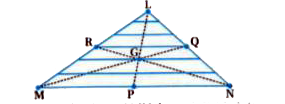Complete Solutions to EXAMPLE of chapter SYSTEMS OF PARTICLES AND ROTATIONAL MOTION of Class 11 book with complete answers and questions
| Class 11 | PHYSICS |
| Chapter | SYSTEMS OF PARTICLES AND ROTATIONAL MOTION |
| NCERT GUJARATI | EXAMPLE |
| Number Of Questions | 16 |
| Academic Year | 2023-24 |
Find the centre of mass of three particles at the vertices of an equilateral triangle. The masses of the particles are 100g, 150g, and 200g respectively. Each side of the equilateral triangle is 0.5m long.
View SolutionFind the centre of mass of a triangular lamina.

View SolutionFind the centre of mass of a uniform L-shaped lamina (a thin flat plate) with dimensions as shown. The mass of the lamina is 3 kg.
View SolutionFind the scalar and vector products of two vectors. `a = (3hati – 4hatj + 5hatk) and b = (– 2hati + hatj – 3hatk )`
View SolutionFind the torque of a force `7hati + 3hatj – 5hatk` about the origin. The force acts on a particle whose position vector is `hati – hatj + hatk`.
View SolutionShow that the angular momentum about any point of a single particle moving with constant velocity remains constant throughout the motion.
View SolutionShow that moment of a couple does not depend on the point about which you take the moments.

View SolutionA metal bar 70 cm long and 4.00 kg in mass supported on two knife-edges placed 10 cm from each end. A 6.00 kg load is suspended at 30 cm from one end. Find the reactions at the knife- edges. (Assume the bar to be of uniform cross section and homogeneous.)
View SolutionA 3m long ladder weighing 20 kg leans on a frictionless wall. Its feet rest on the floor 1 m from the wall as shown in Fig.7.27. Find the reaction forces of the wall and the floor.
View SolutionWhat is the moment of inertia of a disc about one of its diameters?

View SolutionWhat is the moment of inertia of a rod of mass M, length l about an axis perpendicular to it through one end?
View SolutionWhat is the moment of inertia of a ring about a tangent to the circle of the ring?
View SolutionObtain Eq. (7.38) from first principles.
View SolutionThe angular speed of a motor wheel is increased from 1200 rpm to 3120 rpm in 16 seconds. (i) What is its angular acceleration, assuming the acceleration to be uniform? (ii) How many revolutions does the engine make during this time?
View SolutionA cord of negligible mass is wound round the rim of a fly wheel of mass 20 kg and radius 20 cm. A steady pull of 25 N is applied on the cord as shown in Fig. 7.35. The flywheel is mounted on a horizontal axle with frictionless bearings.
(a) Compute the angular acceleration of the wheel.
(b) Find the work done by the pull, when 2m of the cord is unwound.
(c) Find also the kinetic energy of the wheel at this point. Assume that the wheel starts from rest.
(d) Compare answers to parts (b) and (c).
View SolutionThree bodies, a ring, a solid cylinder and a solid sphere roll down the same inclined plane without slipping. They start from rest. The radii of the bodies are identical. Which of the bodies reaches the ground with maximum velocity?
View Solution
EXAMPLE questions and complete solutions for chapter SYSTEMS OF PARTICLES AND ROTATIONAL MOTION of NCERT PHYSICS(GUJRATI) of Class 11